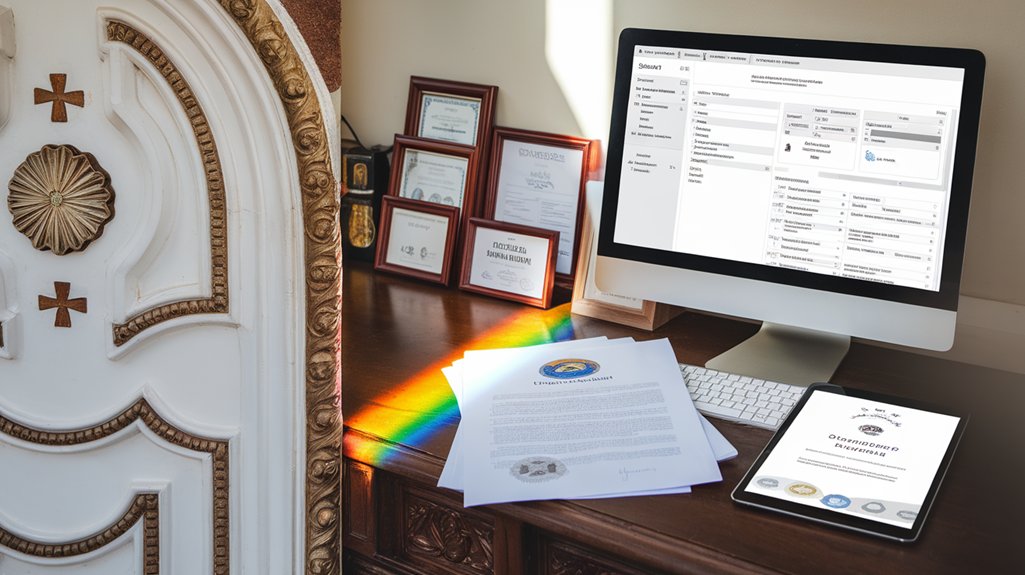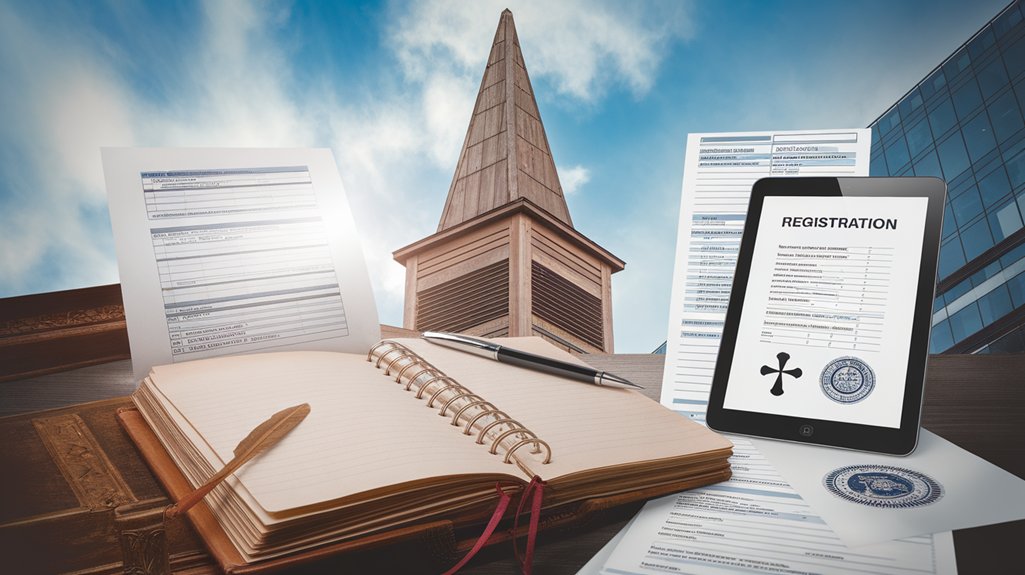Faith-based organizations face unique considerations when registering in SAM. They must accurately represent their religious identity while complying with federal regulations. Required documentation includes TIN, 501(c)(3) verification, notarized authorization letters, and physical address proof. Registration typically takes 7-10 business days. Federal protections prohibit discrimination based on religious character in grant eligibility. Organizations should maintain consistency between their SAM profile and official documentation. The following sections outline specific steps to navigate this process while preserving religious mission integrity.
Religious Liberty Protections in Federal Grant Compliance

While steering through the federal grant landscape, faith-based organizations benefit from robust religious liberty protections established through multiple legal frameworks. The First Amendment’s Free Exercise Clause, coupled with Executive Order 13798, guarantees that religious entities maintain their rights throughout the federal grant process without facing religious discrimination.
Federal agencies must publish policies confirming compliance with these protections, as mandated by OMB Memorandum M-20-09. These safeguards guarantee that grant eligibility remains accessible to faith-based organizations on equal footing with secular counterparts.
Federal agencies’ mandatory policies ensure faith-based organizations access grant opportunities equally alongside secular entities.
Grant conditions explicitly prohibit discrimination based on religious character, with agencies empowered to terminate funding for non-compliant recipients. Organizations must certify their compliance with federal regulations during the application process, including 2 C.F.R. § 200.300, which requires adherence to anti-discrimination laws.
These protections extend to sub-award conditions, preventing disadvantages to applicants based solely on their religious affiliation. Maintaining an active SAM registration is indispensable for faith-based organizations seeking to access and successfully manage federal funding opportunities.
Faith-Based Entity Documentation Requirements

Documentation forms the foundation of a successful SAM registration process for faith-based organizations seeking federal funding opportunities.
Religious institutions must gather specific materials for proper entity identification and compliance with federal regulations.
Faith-based organizations require standard documentation including a Taxpayer Identification Number, legal business name matching IRS records, and banking information for Electronic Funds Transfer.
Additionally, these entities must provide verification of their 501(c)(3) status or exemption under Section 501(a), which confirms their tax-exempt status.
For documentation verification, faith-based entities must submit a notarized Letter of Authorization confirming the registrant’s authority to complete the registration.
This letter must follow specific federal guidelines and be signed by the organization’s leadership.
Faith-based organizations must ensure their physical address is accurately documented, as P.O. Boxes are not accepted for SAM registration purposes.
Many religious organizations also need to document their fiscal year information and provide detailed banking information that adheres to federal financial regulations for proper payment processing.
The registration process typically takes 7-10 business days for approval after all required documentation has been properly submitted.
Organizations should address common challenges that might arise during the registration process to ensure a smooth experience.
Navigating SAM Registration While Preserving Religious Identity

Faith-based organizations face a unique challenge when registering in the System for Award Management (SAM): maintaining their religious character while complying with federal requirements. During the registration process, organizations must guarantee their religious identity is accurately represented in all documentation.
Preserving religious character while navigating federal compliance remains the core balancing act for faith-based entities in SAM registration.
Identity Verification Considerations
When completing identity verification steps, faith-based entities should carefully enter their official organizational name as it appears on tax documents. This consistency prevents registration errors while preserving their religious designation.
Guaranteeing Registration Accuracy
Organizations should:
- Verify all information matches legal documentation
- Properly select the appropriate entity type designation
- Include faith-based mission statements where applicable
- Maintain consistency between SAM profiles and other federal registrations
Accurate record-keeping throughout the registration process helps faith-based organizations maintain compliance while honoring their religious identity.
Regular profile updating procedures are essential for nonprofits to maintain their eligibility for federal funding while continuing their mission-driven work.
When renewal time approaches, having proper documentation readily available streamlines the process.
Frequently Asked Questions
Can SAM Registration Affect Our Religious Hiring Practices?
SAM registration does not directly affect religious hiring practices.
Organizations with religious exemptions can maintain their faith-based hiring criteria regardless of SAM registration status.
The registration process focuses on obtaining a Unique Entity ID and establishing eligibility for government opportunities, not regulating employment practices.
Religious organizations should understand that while SAM registration requires legal compliance in general, it operates independently from the religious exemptions that may apply to their hiring decisions.
Must We Disclose All Faith Elements in Our Programs?
Organizations are not required to disclose all faith elements in their programs during SAM registration.
Program transparency is focused on organizational structure and financial details rather than methodology. The optional “Description of Activities” field allows voluntary disclosure of faith integration components, but is not mandatory.
Post-award audits may review adherence to nondiscrimination requirements. Organizations should maintain documentation that distinguishes between religious activities and grant-funded services to guarantee compliance with federal standards.
How Does UEI Transition Impact Religious Organization Exemptions?
The UEI change generally does not affect religious organizations’ tax exemption status.
However, it does streamline the entity identification process when interacting with government systems.
Religious organizations maintaining their 501(c)(3) status will experience simplified validation procedures and reduced administrative burden during registration.
The new system allows these organizations to maintain their religious exemptions while more efficiently engaging in government transactions, grant applications, and regulatory compliance activities.
Can We Use Faith-Specific Banking Institutions for Federal Payments?
Faith-specific banking institutions are acceptable for federal payments as long as they meet standard requirements.
Organizations must guarantee their chosen bank is FDIC or NCUA-insured and properly registered. The banking information must exactly match the legal entity name in SAM.gov.
Faith banking preferences do not receive special exemptions or restrictions. The critical factor is that account details align with SAM registration to prevent payment processing delays or rejections in federal payment systems.
Are Faith-Based Organizations Subject to Different Renewal Timelines?
Faith-based organizations do not receive different renewal timelines for SAM registration.
All entities must maintain registration consistency by renewing annually, regardless of their religious affiliation. The standard renewal frequency applies universally across organization types, with the recommended 90-day pre-expiration renewal window applying equally to faith-based groups.
Religious organizations must follow identical renewal procedures, update their information regularly, and maintain compliance with federal requirements to guarantee continued eligibility for government contracts and grants.